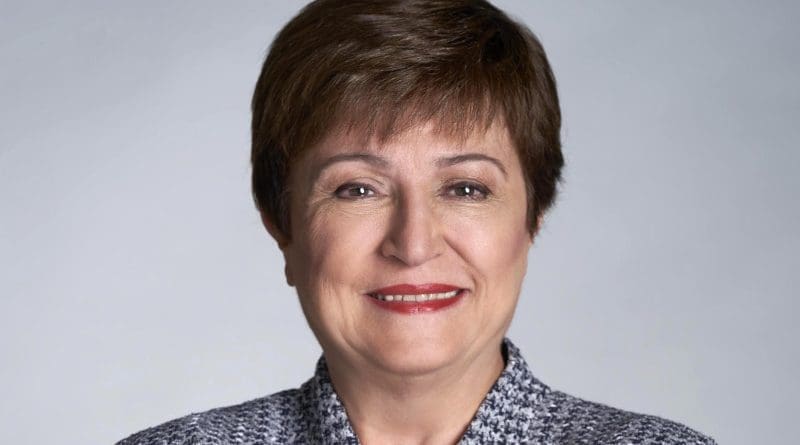Georgieva: Three Seas Initiative Is A path To Smart Development And Comprehensive Economic Growth – Speech
By Kristalina Georgieva, IMF Managing Director
Excellencies and Dear Friends,
I would like to thank wholeheartedly President Radev for his kind invitation. It is always a pleasure to come home, and even more so for a higher purpose.
Since its inauguration six years ago, the Initiative is adding to the region’s positive growth momentum and its remarkable progress. The Three Seas economies continue to outperform their western European neighbors. During 2015-2019 they averaged 3.8 percent GDP growth a year, nearly double the rate of EU-15. This better performance held true during the worst of times last year, as COVID-19 induced deep recession across the world. The Three Seas economies shrank by 4 percent on average, while in Western Europe the contraction was about twice as big. Going forward, the twelve economies are on track to regain their 2019 GDP level by the end of this year and continue to close the income gap in the medium term, growing around 1.2 percent a year more than EU-15 economies through 2025. This is great news — what it means is the region remain firmly on the convergence path with its western neighbors, at par with the aspirations of its people. It is also a reaffirmation of the benefits of building resilient market economies and strong macroeconomic fundamentals — they served the region well when the crisis hit, and will continue to do so in the future.
Much of what you have already done to prioritize infrastructure and connectivity is a key part of this resilience and the ability of your economies to bounce back so strongly now. And it will be vital to sustain convergence.
First, infrastructure investments can significantly boost productive capacity and output. We estimate that, for every euro spent, this will increase output by a factor of 1.7‑2.5 over the long term. And it is not just about boosting the economy of today, but building an economy for tomorrow. The right investments—taking into account the need to adopt low carbon and climate resilient growth path—can not only improve connectivity, but do so by accelerating the transition to the new climate economy, strengthening the region’s competitiveness for the future.
Second, amidst all the hardship and suffering, the pandemic has also focused our minds on the value of digital connectivity. It has always been a priority for the 3SI, and is becoming even more so today.
Third, the pandemic has provided a crash course in how “social” infrastructure is just as meaningful as “physical” infrastructure. The past 16 months have exposed shortcomings in the coverage and quality of healthcare in many parts of the world. This region is no exception—here, healthcare spending is two‑thirds of what it is in western Europe, compounding the challenges from adverse demographics.
Investments in people, especially through health and education, are an essential ingredient to economies that can deliver comprehensive and private sector led growth, even more so after the pandemic, which shook up labor markets.
It is great news that 3SI members, under the Next Generation EU initiative, plan to allocate a larger share of investments to science and healthcare than their ‘EU-15’ neighbors by a ratio of 21 to 12 percent. These plans prioritize digitalization of public administration, schools, and health systems, and mainstreaming green technology through expanding renewable energy sources. They are critical for creating conducive environment for private sector investment.
Smarter and greener growth also requires investment in innovation. Today R&D spending in the Three Seas economies is still on average less than two-thirds of that in western Europe. Fund analysis has found that in advanced economies, an increase of about 0.4 percent of GDP a year in R&D could raise GDP by 5 percent in the medium term. In this regard, I salute your intention to support stronger R&D spending and enhance R&D collaboration to create more innovative economies.
Let me conclude with my commitment for the IMF to stand by you.
Our “Public Investment Management Assessments” can support your work to select and appraise infrastructure projects, and raise spending efficiency. We are adapting them to the needs of the future—we have recently expanded our PIMAs to include climate mitigation and adaptation.
In the spirit of what we are discussing today, IMF advice on overall policy frameworks can support your efforts to create dynamic business environment and facilitate more private investment in connectivity.
And the decision we will soon take on a new $650 billion allocation of Special Drawing Rights will provide a contribution to building your reserves — it may be worth thinking of ways to make best use of this added space for the 3SI mission you are set to pursue.
Let me end on a personal note. When I got my PhD in economics from the then Karl Marx Institute, Bulgaria, like the rest of the countries from the former Soviet Bloc, was not even a member of the IMF. Like our countries, I worked hard to overcome the legacy of our past — and I firmly believe in the strength we acquire in doing so. The Three Seas is an initiative founded with this strength of experience and conviction: my very best wishes for success in deploying it to the fullest for the goal of building vibrant and prosperous economies for all our people.
Thank you.

